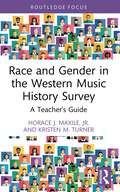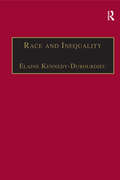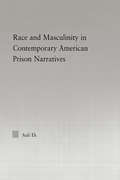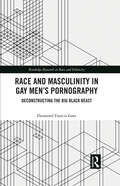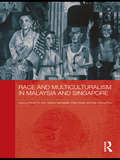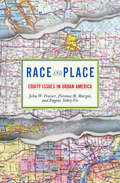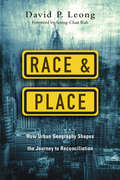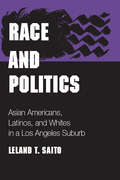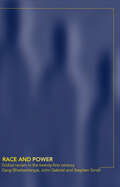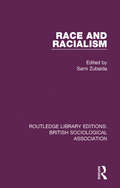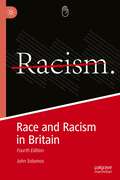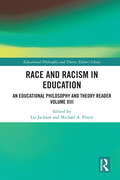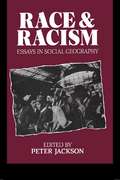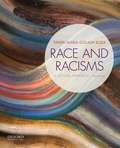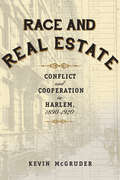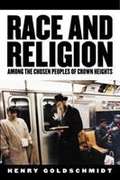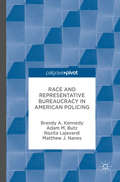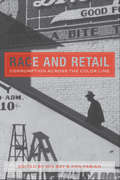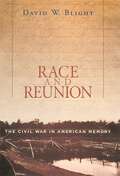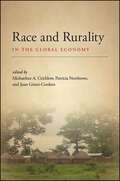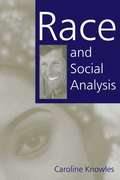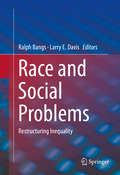- Table View
- List View
Race and Gender in the Western Music History Survey: A Teacher's Guide (Modern Musicology and the College Classroom)
by Horace J. Maxile, Jr. Kristen M. TurnerRace and Gender in the Western Music History Survey: A Teacher’s Guide provides concrete information and approaches that will help instructors include women and people of color in the typical music history survey course and the foundational music theory classes. This book provides a reconceptualization of the principles that shape the decisions instructors should make when crafting the syllabus. It offers new perspectives on canonical composers and pieces that take into account musical, cultural, and social contexts where women and people of color are present. Secondly, it suggests new topics of study and pieces by composers whose work fits into a more inclusive narrative of music history. A thematic approach parallels the traditional chronological sequencing in Western music history classes. Three themes include people and communities that suffer from various kinds of exclusion: Locales & Locations; Forms & Factions; Responses & Reception. Each theme is designed to uncover a different cultural facet that is often minimized in traditional music history classrooms but which, if explored, lead to topics in which other perspectives and people can be included organically in the curriculum, while not excluding canonical composers.
Race and Imperial Defence in the British World, 1870–1914
by John C. MitchamThe first comprehensive account of the cultural and racial origins of the imperial security partnership between Britain, Canada, Australia, New Zealand, and South Africa. Drawing on research from every corner of the globe, John C. Mitcham merges studies of diplomacy, defense strategy, and politics with a wider analysis of society and popular culture, and in doing so, poses important questions about race, British identity, and the idea of empire. The book examines diverse subjects such as the South African War, the Anglo-German naval arms race, Queen Victoria's Diamond Jubilee, and the birth of the Boy Scout Movement, and positions them within the larger phenomenon of British race patriotism that permeated the fin de siècle. Most importantly, Mitcham demonstrates how this shared concept of 'Britishness' gradually led to closer relations between the self-governing states of the empire, and ultimately resulted in a remarkably unified effort during the First World War.
Race and Inequality: World Perspectives on Affirmative Action
by Elaine Kennedy-DubourdieuHow do societies achieve cohesion in countries where the population is formed of different racial and ethnic groups? Although the debate continues, one constant is the agreement on the need for equality for all citizens of such societies. These egalitarian principles are believed by many to underpin a stable and just society. The question then arises of how best to achieve this equality? This book looks at the policy of affirmative action as it has evolved in different parts of the world: Australia, Canada, Great Britain, India, Northern Ireland, South Africa and the United States. The detailed juxtaposition of country case-studies allows readers to make comparisons and highlight disparities. Although affirmative action has operated in favour of various segments of the population, this book concentrates on the policy with regard to racial/ethnic groups. It explores the origin of the concept: where and how the policy emerged and what form it has taken, in order to open up the debate on this highly sensitive area of social policy.
Race and Masculinity in Contemporary American Prison Novels
by Auli EkThis book offers an interdisciplinary analysis of how contemporary American prison narratives reflect and produce ideologies of masculinity in the United States, and in so doing, compellingly engages popular culture in order to demonstrate the profound ways in which implicit understandings of prison life shape all Americans, and their reactions to people both incarcerated and not.
Race and Masculinity in Gay Men’s Pornography: Deconstructing the Big Black Beast (Routledge Research in Race and Ethnicity)
by Desmond Francis GossThis book systematically analyses representations of Black masculinity in gay men’s pornography. This book unpacks 1) the character of pornographic representations of queer Black masculinity and 2) how these representations vary between corporate and non-corporate producers. The author argues that representations of Black men in gay porn rely on stereotypes of Black masculinity to arouse consumers, especially those which characterize Black men as "missing links" or focus excessively on their "dark phalluses." Moreover, these depictions consistently separate gay Black and white men’s sexuality into bifurcated discursive spaces, thereby essentializing sexual aspects of racial identity. Lastly, though such depictions are less prevalent in user-submitted videos, overall, both user-submitted and corporate content reify stereotypes about Black masculinity. This book is written for researchers, lecturers, and graduate courses in the social sciences and humanities, including Sociology, Social Psychology, Sexuality, African American Studies, Women and Gender Studies, LGBTQ Studies, Culture and Art Studies, Porn Studies, Social Media Studies, and Public Health.
Race and Masculinity in Gay Men’s Pornography: Deconstructing the Big Black Beast (Routledge Research in Race and Ethnicity)
by Desmond Francis GossThis book unpacks the character of pornographic representations of queer Black masculinity and how these representations vary between corporate and noncorporate producers. The author argues that representations of Black men in gay porn rely on stereotypes of Black masculinity to arouse consumers, especially those which characterize Black men as "missing links" or focus excessively on their "dark phalluses." Moreover, these depictions consistently separate gay Black and white men’s sexuality into bifurcated discursive spaces, thereby essentializing sexual aspects of racial identity. Lastly, though such depictions are less prevalent in user-submitted videos, overall, both user-submitted and corporate content reify stereotypes about Black masculinity. This book is written for researchers, lecturers, and graduate courses in the social sciences and humanities, including Sociology, Social Psychology, Sexuality, African American Studies, Women and Gender Studies, LGBTQ Studies, Culture and Art Studies, Porn Studies, Social Media Studies, and Public Health.
Race and Multiculturalism in Malaysia and Singapore (Routledge Malaysian Studies Series)
by Philip Holden Daniel P.S. Goh Matilda Gabrielpillai Gaik Cheng KhooThis book explores race and multiculturalism in Malaysia and Singapore from a range of different disciplinary perspectives, showing how race and multiculturalism are represented, how multiculturalism works out in practice, and how attitudes towards race and multiculturalism – and multicultural practices – have developed over time. Going beyond existing studies – which concentrate on the politics and public aspects of multiculturalism – this book burrows deeper into the cultural underpinnings of multicultural politics, relating the subject to the theoretical angles of cultural studies and post-colonial theory; and discussing a range of empirical examples (drawn from extensive original research, covering diverse practices such as films, weblogs, music subcultures, art, policy discourse, textbooks, novels, poetry) which demonstrate overall how the identity politics of race and intercultural interaction are being shaped today. It concentrates on two key Asian countries particularly noted for their relatively successful record in managing ethnic differences, at a time when many fast-developing Asian countries increasingly have to come to terms with cultural pluralism and migrant diversity.
Race and Place: Equity Issues in Urban America
by John W. Frazier Eugene Tettey-Fio Florence M. MargaiRacism, racial equity, and the race-place connections related to racial inequalities in the U. S. are the major themes of this book. The long history of U. S. White racism toward Blacks, Hispanics, and Asians is deeply rooted in the political, socioeconomic, and intellectual frameworks of America, permitting racial inequities to become expressed as cultural landscapes-the places where many racial minorities exist. The contemporary geographic patterns of segregation and isolation are different from those of earlier U. S. history, but are equally damning and present extremely difficult challenges for social action in a nation that will change its racial/ethnic composition dramatically during the current generation. As America changes over the next quarter century, the visible and invisible race-place inequalities that help define U. S. urban geography will continue in housing, education, employment, travel requirements, shopping choices, environmental hazards, and other living conditions. Minority groups, ever increasing in numbers, will find inequalities unacceptable. How America deals with racial inequalities will likely have consequences for all its citizens.
Race and Place: How Urban Geography Shapes the Journey to Reconciliation
by Soong-Chan Rah David P. LeongGeography matters.Race and Place
Race and Politics: Asian Americans, Latinos, and Whites in a Los Angeles Suburb (Asian American Experience)
by Leland T. SaitoLocated a mere fifteen minutes from Los Angeles, the San Gabriel Valley is an incubator for California's new ethnic politics. Here, Latinos and Asian Americans are the dominant groups. Politics are Latino-dominated, while a large infusion of Chinese immigrants and capital has made the San Gabriel Valley the center of the nation's largest Chinese ethnic economy. The white population, meanwhile, has dropped from an overwhelming majority in 1970 to a minority in 1990. Leland T. Saito presents an insider's view of the political, economic, and cultural implications of this ethnic mix. He examines how diverse residents of the region have worked to overcome their initial antagonisms and develop new, more effective political alliances. Tracing grassroots political organization along racial and ethnic lines, Race and Politics focuses on the construction of new identities in general and the panethnic affiliation "Asian American" in particular.
Race and Power: Global Racism in the Twenty First Century
by John Gabriel Stephen Small Gargi BhattacharyyaReviewing cutting-edge debates around racial politics and the culture and economy of globalization, this book draws together a wide range of important contemporary debates in a clear and concise way for undergraduate students. Far from concluding that racism is over, the authors contend that the forces of globalization inhabit older cultures of racial division in order to safeguard the economic interests of the privileged. Arguing that the unspoken culture of whiteness informs much that passes in the name of globalization, the book suggests that we are witnessing a reformulation of economic relations around global racisms. Alongside these shifts in economic relations, racialized identities evolve to encompass mixed heritages and mixed cultures both in personal identities and in lifestyle choices. This is one of the few texts that concentrates on the theory of race rather than politics. It looks at race in global terms, and at 'whiteness' as a part of ethnic studies.
Race and Racialism (Routledge Library Editions: British Sociological Association #23)
by Sami ZubaidaOriginally published in 1970, Race and Racialism aims to bring race discussions into the mainstream of sociological discussion through scrutinizing concepts that defines theoretical issues. The book also locates race-relation situations in the context of the wider social structure and historical developments. Contributions raise the question of the abuse of biological and sociological theories in justifying social attitudes and policies and address various principles of social stratification that bear on the study of race relations. The book also looks at the how no special social categories are required to explain the structure and dynamics of race relations, and how the concept of plural society represents a significant theoretical development.
Race and Racism in Britain: Fourth Edition
by John SolomosThis Fourth Edition of a pioneering handbook provides a critical analysis of the origins and evolution of political and policy debates regarding race and racism in British society. Drawing on a broad range of both theoretical and historical research, the focus of the book is on the development of policies and debates in the period from the second half of the 20th Century to the present. The book is organized into twelve chapters which provide an overview of key trends, situating the development of policies and developments in relation to immigration and citizenship, race relations policies and broader agendas about multiculturalism and living with difference. In the substantive chapters of the book there is also a detailed discussion of such issues as policing, urban unrest and protest, racist politics, black and ethnic minority politics and conversations about multiculturalism. This new edition engages with both the historical background as well as contemporary developments to provide a novel and wide-ranging account of the role that questions about race and racism play in British society.
Race and Racism in Education: An Educational Philosophy and Theory Reader Volume XIII (Educational Philosophy and Theory: Editor’s Choice)
by Michael A. Peters Liz JacksonRacism has been endemic in the history of western societies, while the nature of race as a social category of difference is controversial and rigorously contested from scholarly and everyday perspectives today. This edited collection traces the history of considerations of the meaning and importance of race and racism in society and education through a deep dive into the contents of the archives of the journal Educational Philosophy and Theory. Journal articles from the 1970s to today have been carefully selected throughout the text to showcase the trends and transformations in the field of educational philosophy over time. While historically western analytic philosophy of education did not focus particularly on race and racism, this changed in the 1990s, with the emergence of critical conversations about social justice that moved beyond liberal models. More recently, historical and theoretical accounts have sought to understand the processes of racialization in depth, as well as the intersectional nature of race privilege and discrimination across contemporary diverse societies worldwide. Taken together, the pieces in this book illustrates both the history of theorizing about race and racism in educational philosophy and theory as well as the breadth of present-day concerns. This collection provides a foundation for developing a historical understanding of the position of race and racism in philosophy of education, while it also inspires new works in Critical Race Theory, Black and African Studies, critical pedagogy, and related areas. Additionally, it will inspire educators and scholars across diverse fields to further consider the significance of race and racism in education and in research in the present age.
Race and Racism: Essays in Social Geography
by Peter JacksonFirst Published in 1987. Routledge is an imprint of Taylor & Francis, an informa company.
Race and Racisms: A Critical Approach
by Tanya Maria Golash-BozaRace and Racisms: A Critical Approach, Second Edition, engages students in significant--and timely--questions related to racial dynamics in the U.S. and around the world. Written in accessible, straightforward language, the book discusses and critically analyzes cutting-edge scholarship in the field.
Race and Real Estate
by Kevin McgruderThrough the lens of real estate transactions from 1890 to 1920, Kevin McGruder offers an innovative perspective on Harlem's history and reveals the complex interactions between whites and African Americans at a critical time of migration and development. During these decades, Harlem saw a dramatic increase in its African American population, and although most histories speak only of the white residents who met these newcomers with hostility, this book uncovers a range of reactions.Although some white Harlem residents used racially restrictive real estate practices to inhibit the influx of African Americans into the neighborhood, others believed African Americans had a right to settle wherever it was affordable and helped facilitate sales. These years saw Harlem transform not into a "ghetto,"as many histories portray, but into a community that became a symbol of both the possibilities and challenges black populations faced across the nation. The book also introduces alternative reasons behind African Americans' migration to Harlem, showing that they came not to escape poverty but to establish a lasting community. Owning real estate was an essential part of this plan, along with building churches, erecting youth-serving facilities, and gaining power in public office.
Race and Real Estate: Conflict and Cooperation in Harlem, 1890-1920
by Kevin McGruderThrough the lens of real estate transactions from 1890 to 1920, Kevin McGruder offers an innovative perspective on Harlem's history and reveals the complex interactions between whites and African Americans at a critical time of migration and development. During these decades Harlem saw a dramatic increase in its African American population, and although most histories speak only of the white residents who met these newcomers with hostility, this book uncovers a range of reactions. Although some white Harlem residents used racially restrictive real estate practices to inhibit the influx of African Americans into the neighborhood, others believed African Americans had a right to settle in a place they could afford and helped facilitate sales. These years saw Harlem change not into a "ghetto," as many histories portray, but into a community that became a symbol of the possibilities and challenges black populations faced across the nation. This book also introduces alternative reasons behind African Americans' migration to Harlem, showing that they came not to escape poverty but to establish a lasting community. Owning real estate was an essential part of this plan, along with building churches, erecting youth-serving facilities, and gaining power in public office. In providing a fuller, more nuanced history of Harlem, McGruder adds greater depth in understanding its development and identity as both an African American and a biracial community.
Race and Religion Among the Chosen Peoples of Crown Heights
by Henry GoldschmidtIn August of 1991, the Brooklyn neighborhood of Crown Heights was engulfed in violence following the deaths of Gavin Cato and Yankel Rosenbaum—a West Indian boy struck by a car in the motorcade of a Hasidic spiritual leader and an orthodox Jew stabbed by a Black teenager. The ensuing unrest thrust the tensions between the Lubavitch Hasidic community and their Afro-Caribbean and African American neighbors into the media spotlight, spurring local and national debates on diversity and multiculturalism. Crown Heights became a symbol of racial and religious division. Yet few have paused to examine the nature of Black-Jewish difference in Crown Heights, or to question the flawed assumptions about race and religion that shape the politics—and perceptions—of conflict in the community. <p> In Race and Religion among the Chosen Peoples of Crown Heights, Henry Goldschmidt explores the everyday realities of difference in Crown Heights. Drawing on two years of fieldwork and interviews, he argues that identity formation is particularly complex in Crown Heights because the neighborhood's communities envision the conflict in remarkably diverse ways. Lubavitch Hasidic Jews tend to describe it as a religious difference between Jews and Gentiles, while their Afro-Caribbean and African American neighbors usually define it as a racial difference between Blacks and Whites. These tangled definitions are further complicated by government agencies who address the issue as a matter of culture, and by the Lubavitch Hasidic belief—a belief shared with a surprising number of their neighbors—that they are a “chosen people” whose identity transcends the constraints of the social world. <p> The efforts of the Lubavitch Hasidic community to live as a divinely chosen people in a diverse Brooklyn neighborhood where collective identities are generally defined in terms of race illuminate the limits of American multiculturalism—a concept that claims to celebrate diversity, yet only accommodates variations of certain kinds. Taking the history of conflict in Crown Heights as an invitation to reimagine our shared social world, Goldschmidt interrogates the boundaries of race and religion and works to create space in American society for radical forms of cultural difference.
Race and Representative Bureaucracy in American Policing
by Brandy A. Kennedy Adam M. Butz Nazita Lajevardi Matthew J. NanesThis book examines issues of race and policing through the lens of representative bureaucracy theory. According to representative bureaucracy theory, demographic correspondence between government employees and the local population can lead to more favorable outcomes for minority groups. It argues that police forces with higher minority composition will have more positive outcomes across measures such as fewer excessive force complaints and fewer fatal encounters with officers. Additionally, the book asserts that more representative forces will demonstrate responsiveness and accountability by implementing policies such as citizen review boards for excessive force complaints. It does this by first providing a brief overview of issues surrounding race and policing in America, documenting racial representation occurring in local police forces nationwide, and exploring the potential causes and consequences of underrepresentation. It concludes by discussing the implications of our findings and offer potential policy remedies and solutions that local law enforcements can pursue in order to reduce minority underrepresentation and improve policing outcomes.
Race and Retail: Consumption across the Color Line
by Jerome D. Williams Geraldo L. Cadava Ellen D. Wu John W. Heaton Azure B. Thompson Stacey A. Sutton Johana Londoño Anne-Marie G. Hakstian Erualdo R. González Geraldine Rosa Henderson Siobhan Carter-David Professor Ann Fabian Sharese N. Porter Traci Parker Bridget Kenny Neiset Bayouth Melissa L. Cooper Naa Oyo Kwate Sophia R. Evett Professor Mia BayRace has long shaped shopping experiences for many Americans. Retail exchanges and establishments have made headlines as flashpoints for conflict not only between blacks and whites, but also between whites, Mexicans, Asian Americans, and a wide variety of other ethnic groups, who have at times found themselves unwelcome at white-owned businesses. Race and Retail documents the extent to which retail establishments, both past and present, have often catered to specific ethnic and racial groups. Using an interdisciplinary approach, the original essays collected here explore selling and buying practices of nonwhite populations around the world and the barriers that shape these habits, such as racial discrimination, food deserts, and gentrification. The contributors highlight more contemporary issues by raising questions about how race informs business owners' ideas about consumer demand, resulting in substandard quality and higher prices for minorities than in predominantly white neighborhoods. In a wide-ranging exploration of the subject, they also address revitalization and gentrification in South Korean and Latino neighborhoods in California, Arab and Turkish coffeehouses and hookah lounges in South Paterson, New Jersey, and tourist capoeira consumption in Brazil. Race and Retail illuminates the complex play of forces at work in racialized retail markets and the everyday impact of those forces on minority consumers. The essays demonstrate how past practice remains in force in subtle and not-so-subtle ways.
Race and Reunion
by David W. BlightNo historical event has left as deep an imprint on America's collective memory as the Civil War. In the war's aftermath, Americans had to embrace and cast off a traumatic past. David Blight explores the perilous path of remembering and forgetting, and reveals its tragic costs to race relations and America's national reunion. In 1865, confronted with a ravaged landscape and a torn America, the North and South began a slow and painful process of reconciliation. The ensuing decades witnessed the triumph of a culture of reunion, which downplayed sectional division and emphasized the heroics of a battle between noble men of the Blue and the Gray. Nearly lost in national culture were the moral crusades over slavery that ignited the war, the presence and participation of African Americans throughout the war, and the promise of emancipation that emerged from the war. "Race and Reunion" is a history of how the unity of white America was purchased through the increasing segregation of black and white memory of the Civil War. Blight delves deeply into the shifting meanings of death and sacrifice, Reconstruction, the romanticized South of literature, soldiers' reminiscences of battle, the idea of the Lost Cause, and the ritual of Memorial Day. He resurrects the variety of African-American voices and memories of the war and the efforts to preserve the emancipationist legacy in the midst of a culture built on its denial. Blight's sweeping narrative of triumph and tragedy, romance and realism, is a compelling tale of the politics of memory, of how a nation healed from civil war without justice. By the early twentieth century, the problems of race and reunion were locked in mutual dependence, a painful legacy that continues to haunt us today.
Race and Rurality in the Global Economy (SUNY Press Open Access)
by Michaeline A. Crichlow; Patricia Northover; Juan Giusti-CorderoIssues of migration, environment, rurality, and the visceral "politics of place" and "space" have occupied center stage in recent electoral political struggles in the United States and Europe, suffused by an antiglobalization discourse that has come to resonate with Euro-American peoples. Race and Rurality in the Global Economy suggests that this present fractious global politics begs for closer attention to be paid to the deep-rooted conditions and outcomes of globalization and development. From multiple viewpoints the contributors to this volume propose ways of understanding the ongoing processes of globalization that configure peoples and places via a politics of rurality in a capitalist world economy, and through an optics of raciality that intersects with class, gender, identity, land, and environment. In tackling the dynamics of space and place, their essays address matters such as the heightened risks and multiple states of insecurity in the global economy; the new logics of expulsion and primitive accumulation dynamics shaping a new "savage sorting"; patterns of resistance and transformation in the face of globalization's political and environmental changes; the steady decline in the livelihoods of people of color globally and their deepened vulnerabilities; and the complex reconstitution of systemic and lived racialization within these processes. This book is an invitation to ask whether our dystopia in present politics can be disentangled from the deepening sense of "white fragility" in the context of the historical power of globalization's raced effects.This book is freely available in an open access edition thanks to Knowledge Unlatched—an initiative that provides libraries and institutions with a centralized platform to support OA collections and from leading publishing houses and OA initiatives. Learn more at the Knowledge Unlatched website at: https://www.knowledgeunlatched.org/, and access the book online at the SUNY Open Access Repository at <a href="http://hdl.handle.net/20.500.12648/7136 ">http://hdl.handle.net/20.500.12648/7136 .
Race and Social Analysis
by Professor Caroline Knowles'This book is well researched and highly accessible. It is both a useful and much needed addition to the literature on race and social research' - Ethnic and Racial Studies 'The book is well laid out with glossaries of significant new terms and summaries of key points at the end of each chapter, extensive notes and a very useful bibliography. Knowle's book is a welcome contribution to our understanding, and its emphasis on social analysis helps to bridge what sometimes appears to be a widening gap between the academic and policy/practitioner communities. She provides some significant insights into the inter-relationships between everyday race/ethnicity making and contemporary political and theoretical understandings' - Runnymede's Quarterly Bulletin 'Knowles writes eloquently about how we can challenge and change racist ideas, and ideas about race...this is an important and enjoyable book, which would be valuable to academics or students of any discipline' - Sociological Research Online In Race and Social Analysis, Caroline Knowles combines biographical and spatial analysis to provide an up-to-date account of the ways race and ethnicity operate in a global context. The author argues that race and ethnicity is intricately woven into the social landscapes in which we live - encompassing both the mundane interactions of daily life and the ways in which the contemporary world is organized. Through social analysis, the book shows the ways in which we all contribute to race making and the forms of social inequality it produces. Drawing on the work of other authors in the field and extending it to provide some avenues into conceptualizing and researching race, Caroline Knowles examines: · how race and ethnicity operate in the social world · the making of race and ethnicity by the connections between people, spaces and places · the ways race and ethnicity articulate current analytical themes in social science such as space, movement and global networks · the ways in which broader structures of racial orders are apparent in everyday lives and the stories people tell about them · the ways in which places and spaces are raced and ethnicised · the ways in which race is significant in the operation of globalization and global migration · the making of whiteness Race and Social Analysis offers a grounded theoretical examination of race & ethnicity that draws upon examples in Britain, the United States, Canada and Australia. It offers a unique take on the available literature by adding a missing British account of `whiteness'.
Race and Social Problems
by Larry E. Davis Ralph BangsAs much as Americans believe in the promise of an egalitarian, color-blind society, the reality is far from that ideal. People of color consistently lag behind their white counterparts in key quality-of-life areas. Despite many significant gains, widespread structural inequalities continue to exist and thrive. Race and Social Problems takes the long view of this state of affairs, offering both multi-level analysis and a practical blueprint for social justice. It begins by explaining how race-related social problems have changed over the decades. This volume identifies factors contributing to their persistence in this century, most notably the central role of economic disparities in exacerbating related social problems and replicating them for future generations. The chapters expand on this knowledge by detailing innovative and successful strategies for addressing aspects of six major areas of inequality: Poverty: challenging standard American concepts of poverty. Education: approaches toward closing the achievement gap. Intergroup relations: enhancing race dialogues. Family and lifespan: programs targeting families, youth, and elderly. Criminal justice: reducing incarceration and increasing public safety. Health and mental health: promoting positive outcomes. Race and Social Problems casts a wide net across the most pressing social issues, clarifying both the immediate and larger tasks ahead for a range of professionals in such diverse fields as social work, anthropology, communications, criminology, economics, history, law, political science, psychology, public health, and sociology.
